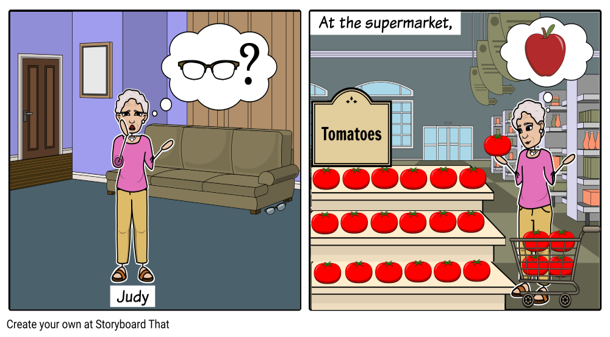LESSON GOAL
Let’s check our lesson goal.
In this material, you will learn the words and phrases that are related to elderly care.
In this material, you will learn the words and phrases that are related to elderly care.
この教材では、介護に関する語彙や表現を学びます。
PART A_1
Fill in the missing letters of the word to complete each sentence. Read the meaning aloud and use it as a clue.
PART A_2
| 1. word: |
_
I
G
_
A
T
E
|
| meaning: | [verb] to move (live or work) in another place |
| sentence: | His grandparents _____________ to the countryside. |
| 2. word: |
_
E
_
K
S
|
| meaning: | [noun] advantages or benefits |
| sentence: | The elderly in Japan enjoy a lot of _____________. |
| 3. word: |
_
E
T
_
R
E
M
_
N
T
|
| meaning: | [noun] a period in someone’s life when he/she stops working |
| sentence: | My grandfather had an early _____________. |
PART B_1
Let’s read the dialogue. I will play Ron and you will play Emma. Then, we’ll switch roles.
PART B_2

Are you coming to Annie’s birthday party tomorrow?
|
I’m afraid I can’t. I am going to visit my grandparents. Are you coming to the party? |

Yes, I am. I hope I can visit my grandparents, too. Anyway, how often do you hang out with them? It must be fun.
|
I visit them once or twice a week. When I have free time, I stay at their house over the weekend. I bring them food and we eat together while watching TV. |

Wow, that’s nice. I also want to visit my grandparents, but they migrated to the United States. My aunt and uncle are taking care of them.
|
Don’t worry, Ron. I know you can visit them soon. For now, you can show them that you care by calling them often. I think it will really mean a lot to them. |

That’s right, Emma. That’s the least that I can do for now. They are “getting on in years”. I hope I could visit them next year.
|
I’m sure you can do that. Anyway, I need to go now. I need to buy some stuff for my grandparents. See you next week. |
PART B_3
Please answer the questions in complete sentences.
PART B_4
| 1. | Why can’t Emma attend Annie’s birthday party? |
| Answer: | |
| 2. | What does Emma do with her grandparents when she has free time? |
| Answer: | |
| 3. | In what way can Ron show that he really cares for his grandparents? |
| Answer: | |
| 4. | What does Ron mean by “getting on in years”? |
| Answer: |
PART C_1
Study the pictures for 1 minute. Tell a story based on the pictures.
PART C_2

PART D_1
Please answer the questions by stating your opinions.
PART D_2
| 1. | Many say that people older than 60 should no longer work. Do you agree or disagree? |
| Answer: | |
| 2. | Would you rather retire early or enjoy working for as long as you like? |
| Answer: |
PART E_1
Let’s talk. Please answer my questions.
PART E_2
| 1. | What activities do you do with your grandparents? |
| Answer: | |
| 2. | How does your country help the elderly population? |
| Answer: | |
| 3. | What kind of activities do the elderly do in your country after retirement? |
| Answer: | |
| 4. | What perks do the elderly enjoy in your country? |
| Answer: | |
| 5. | Is living a very long life a good thing or not? |
| Answer: |
REVIEW AND FEEDBACK
Now, let us review the things that you learned in this lesson.
ではこのレッスンで学んだことを振り返りましょう。
(Please give a short feedback on how your student did on your class.)
| Grammar 文法 |
Pronunciation 発音 | Vocabulary 単語 |
Comprehension 理解 |
|
|---|---|---|---|---|
 GOOD GOOD |
文法の誤りはほとんどなく、完全な文章で話すことができる | ほとんどの単語をはっきりと正しく発音することができる | 習った表現を適切に使うことができる | 文章を理解し、質問に正しく答えることができる |
 FAIR |
文法の誤りはあるが、完全な文章で話すことができる | 発音の練習が必要な言葉がいくつかある | たまにミスはあるが、習った表現を適切に使うことができる | 文章を完全に理解するのは難しく、質問に正しく答えられないときもある |
 POOR |
文章で話すのは難しく、単語だけで話すことができる | 発音の練習が必要である | 習った単語と表現を少しだけ使うことができる | 文章を理解するのは難しく、質問に答えるのは難しい |
レッスン教材に関するアンケートのお願い
レッスン教材の改善・拡充を図ることを目的とし、アンケートを実施しております。
以下のURLからアンケートにお答えいただき、 ご意見・ご要望をお聞かせください。
アンケートはこちら